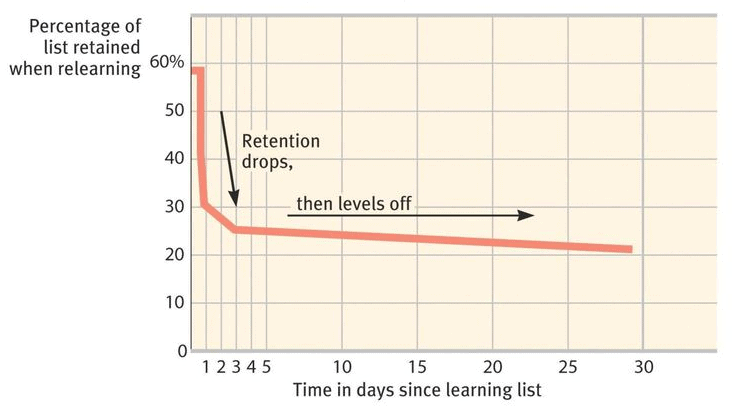There are two places where we store memories. Most of our memories are stored in our long-term memory. (You can watch a video all about this limitless memory storage in another video.) In this video, we are going to focus on short-term memory storage.
This storage has limits, and in some cases, can be completely obliterated. But research on short-term memory has given scientists important information on how we store and process memories, as well as ways that we can improve our ability to remember information.
Let’s get started.
What is Short Term Memory?
Short Term Memory refers to the ability to hold a small amount of information in your mind for a short period of time. Two important qualities of short term memory are that you can't manipulate the information (unlike working memory) and it doesn't last for more than 18 seconds.

Looking to test your short-term memory for free? Check out our free memory test and find your results in less than 5 minutes!
Our short-term memory storage goes through a lot of disposals. We can only remember things short-term for so long! But how much information can you store in your short-term memory, and how long will information last in this part of your memory storage?
The exact numbers vary for everyone, but research on short-term memory has given us a good estimate of the average duration and capacity of short-term memory storage.
What's the Capacity?
In the world of psychology, the “magic number” of items that you can store in your short-term memory is “Seven, Plus or Minus Two.” This magic number is based on a paper written by American psychologist George Miller. There are ways to “hack” this capacity, but we will talk about it later in the article.
How long does Short Term Memory last?
Short Term Memory lasts around 18 seconds, however, you can stretch this duration out to 30 seconds or more if you actively rehearse or repeat the items in your head. If you make no effort to remember these items, they will disappear in a manner of seconds.
You can only keep seven (plus or minus two) items in your head for so long. Some studies suggest that this 30-second duration can extend up to one minute, but for most people, 30 seconds is the limit.
There are multiple theories that explain why pieces of information leave our short-term memory storage. In this video, we’ll talk about how distraction and interference might take over, or the information simply “decays.” The best method to remember what's in your short-term memory is to store it in your long-term memory.
Decay Theory
Why do we forget? Why do pieces of information leave our short-term memory after a period of time?
One of the explanations is the Decay Theory or the Trace Decay Theory of Forgetting. This theory is relatively simple; it states that memories decay over time. When the memory is initially created, it leaves a “trace” of chemical changes in the brain. As time passes, that trace fades away.
On one hand, this theory is perfectly sensible. We are more likely to remember a phone number told to us two minutes ago than a phone number that was told to us two weeks ago. We are likely to remember what we ate yesterday, but less likely to recall anything significant from a specific date four years ago.
...in most cases.
This theory has been disputed, partly because people do have such strong memories of events from certain dates and events in their lives. People may recall significant (or seemingly insignificant) pieces of information from a long time ago, but may not remember what they ate for breakfast. Not all memories just fade away. Here is a graph that shows how much of a list is retained during a 'relearning' process:

This theory is not easy to test and prove, partially because it’s hard to control for repetition and distraction.
Displacement and Distractions
Let’s go back to the idea that you might remember what you had for breakfast yesterday, but not what you had for breakfast two years ago. There is a lot that happened between two years ago and yesterday. You had over 600 breakfasts, 600 lunches, 600 dinners.
You were asked to remember phone numbers and study for tests and make mental notes of your best friend’s birthday. Even if you tried your hardest to remember what you had for breakfast on a specific date, there are so many things to distract you from that memory.
This is another theory that tries to explain why we forget things. We displace previous memories with other memories.
Serial Position Effect and Recency Theory
One study to support this theory has also contributed to the Serial Position Effect and Recency Theory. In the study, researchers gave participants a list of information to memorize. The participants were separated into two groups. The first group recalled the items immediately. The second group was given a distraction task to complete for a few seconds before being asked to recall the information.
The results from both groups supported the Serial Position Effect: the information at the beginning and the end was more likely to be recalled by participants. However, the group who completed the distraction tasks were much less likely to recall the items at the end of the list.
Those items were stored in short-term memory, but with distractions, they were displaced quickly.
Do you like to multi-task?
The displacement theory is one piece of evidence that supports the idea that multi-tasking isn’t so productive.
Each new task that you refer back to is a distraction. The meme you saw on Facebook is likely to interfere with storing information that you are trying to study. This constant distraction and displacement of memory can potentially affect your ability to store information long-term.
Anterograde Amnesia (Short Term Memory Loss)
We can’t talk about short-term memory storage without talking about our favorite fish that...doesn’t have short-term memory. Yes, I’m talking about Dory. Dory’s most unique characteristic was her inability to hold onto information for more than a few seconds. While comical, it has lead many people to wonder...is short-term memory loss a real condition?
It is! It’s called Anterograde Amnesia.

Anterograde amnesia is a condition in which people develop a partial or complete inability to recall the recent past. Memories are created, but often immediately forgotten or decayed. Even after five seconds, a person with anterograde amnesia cannot recall something that was just said to them.
What Causes Short Term Memory Loss?
How does one develop Anterograde Amnesia? There are a few ways:
- Benzodiazepine drugs (also known as “benzos”)
- Too much alcohol (also known as a “blackout”)
- Traumatic brain injury
- Emotional disorders
- Illnesses that cause neurological deterioration
Can You Restore Short Term Memory?
Memories must be converted to long term memory if we want to recall them later in life. Yes, you may remember something that you thought you had forgotten a long time ago. Those memories were hidden somewhere in your long term memory. Information from our short term memories, if not converted, are lost forever. That’s why you might have to piece together your wild night out with the help of other people whose memories were converted to long-term memory.
Short-term memory loss can be terrifying. There is no cure for short-term memory loss if it’s the result of a disease like Parkinson’s or Alzheimer’s. However, there are ways that you can slow the effects of short-term memory loss and keep your memories intact.
- Getting 8+ hours of sleep every night
- Eating a healthy diet with Omega-3 supplements
- Completing puzzles, playing instruments, or doing other activities that challenge the brain
- Organizing information like everyday tasks on to-do lists
Other ways to slow short-term memory loss may depend on what is causing the short-term memory loss in the first place. If a medication, tumor, or mental health condition is causing memory loss, different treatments can help slow its progress. If you are concerned about your short-term memory, consider reaching out to your primary care doctor for a proper assessment.
Fortunately, research on long-term memory storage is making progress. Some believe that if the connections between certain synapses can be restored, so can long-term memories!
Can You Increase Short Term Memory?
We all know someone whose memory is spot-on. And we all know someone who...needs to write everything down. Memory is a good thing to have! A lack of short-term memory can be embarrassing, or even dangerous. But are there ways to train your brain to remember more things in a short period of time?
The answer is yes!
Chunking
You now know that your short-term memory storage is limited. The brain can only keep 5-9 items in your short-term memory at a time. But there’s a way to “hack” this limit and retain more information in your short-term memory for a longer period of time. This hack is called “chunking.”
Chunking just requires that you “chunk” multiple pieces of information together to form a single group of items to remember. While the brain can store only 5-9 pieces of individual information, research shows that you can store up to four chunks of information. If each chunk has four pieces of information attached to it, you can hack your way into recalling 16 things that you need to remember.
One of the most common examples of chunking is memorizing phone numbers. Memorizing ten individual numbers at a time is no easy task. But when you separate things into three chunks (the area code, the first three numbers, and the last four numbers,) remembering that phone number is entirely possible.
Other Ways to Improve Short-Term Memory
Chunking can be used alongside other memory “hacks” that expand your ability to store more items in your short-term memory. These hacks include memory tricks, like:
- Acronym
- Acrostic
- Other mnemonic tricks
I’ve got a whole video on these different tricks that you can watch!
Short Term Memory Tests
Want to test out your short-term memory storage? Use the following links to test out your memory:
- Short-Term Memory Test from University of Washington
- DIY Test from VeryWellMind
- Short-Term Memory Quiz on The Mirror
We are still a long way from completely understanding how short term memory works, and what we can do to prevent forgetting and displacement. The best solution seems to be storing short term memory in long term memory.
There are also other forms of memory, including working memory and long-term memory, which cognitive scientists have studied for years trying to figure out.
This article aims to be the best of the best at teaching young psychology students everything there is about short term memory, so if you think I missed something, or you found some new research that's relevant, please leave a comment below!
